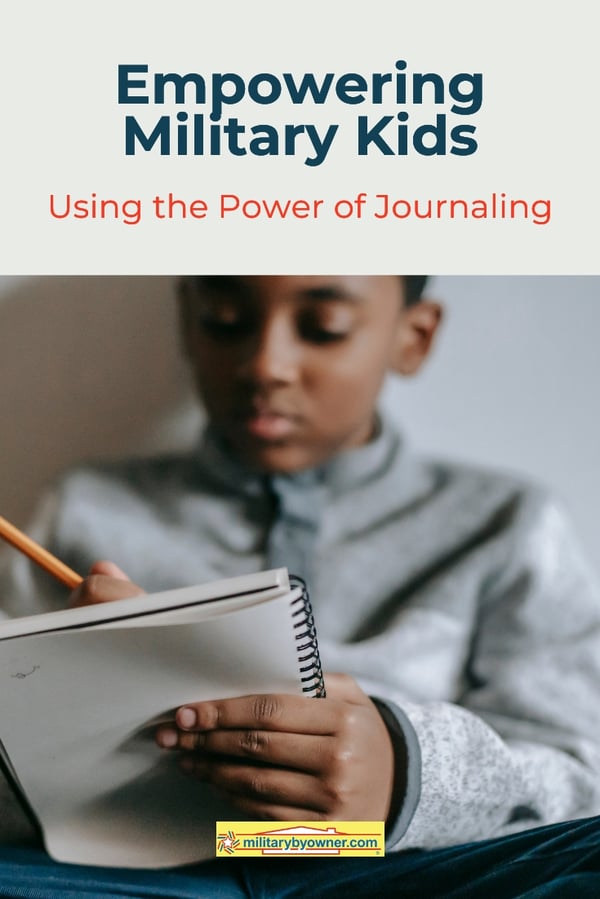Empowering Military Kids Using the Power of Journaling
During the Month of the Military Child (MOMC), we're highlighting how one school actively supports and recognizes its military students while focusing on the importance of journaling as a form of expression for kids who don’t always have the words to share their feelings.
Many sources, from heavily researched science annuals to The Huffington Post, describe the psychological power the written word provides. This is never truer than for kids struggling with transitions who need a way to cope. Written or drawn thoughts and emotions are proven ways for young ones to process feelings when so much of their daily lives are out of their direct control.
A military child's journal has many different uses:
- A place for privacy. Kids benefit from a safe space to sort out their feelings.
- A record of childhood. The good, bad, and in-between are all fun to read about later as an adult.
- A tool. Journals are a great way to foster ongoing communication between parents and children. Kids can discuss difficult life scenarios in a journal and passed between parent and child as needed. Sometimes, verbal conversations are just too hard.
 Journaling in Elementary School
Journaling in Elementary School
Our school has a large population of military kids, so our school administration and a vibrant and active PTA routinely advocate for an active Military Family Support Group. The all-inclusive group meets regularly and participates in activities ranging from donuts before school to information-sharing sessions presented by our local School Liaison Officer and special after-school MOMC journaling activities.
As part of our school’s April Month of the Military Child event schedule, our administration asked a fellow military spouse and me to present a small journaling workshop for the school’s military students. We started the event by stirring the kids’ creative juices with rounds of introduction games, such as “Where Have You Lived?” and “Who Has Lived the Furthest Away?” After that, we set out to transfer those recollected memories into keepsake hardbound journals.
Do You Know About These Resources for Military Kids?
Graphic from Military OneSource
The Journaling Process for Kids
During that hour, we encouraged the kids to tell their stories in any way they liked, including drawings and their best memories of places they’ve lived. We took these steps to guide the kids into journaling for the first time.
We chose the topic, "Your Favorite Duty Station," then we asked the kids to talk with their seatmates about their "best of" lists, such as restaurants, activities, and events near their favorite cities. We reminded the kids that details were important and memories could get blurry as they got older. The best way to not forget would be to document their experiences in any way they wanted, such as:
- Bullet points
- Paragraphs
- Drawings or photographs
- Poems
We anticipated that many of the kids attending would be there to create journals because they would leave our school over the summer and PCS to their next city. So we loaded them up with a few souvenirs with our school logo, and a couple of kids went home with an extra prize from a book raffle.
Before the kids left, we asked them to remember just one thing about the power of journaling and the connection to other military kids.
You can always start a new friendship in a new place by asking, “Where have you lived?”
Their military life stories will always be an immediate link to potential military and non-military friends. It’s comforting for young kids to have detailed adventures prepared in their minds to discuss when meeting new people, whether at school or in their neighborhoods.
See this 2024 Month of the Military Child Fact Sheet provided by Military OneSource.
Graphic from Military OneSource
Month of the Military Child Resources
If your school doesn’t offer MOMC activities, there are ways to celebrate at home or with a group of military kids in your neighborhood. Check out these free resources to spark inspiration for journaling.
- Military OneSource Month of the Military Child Tool Kit
- Military Child Education Coalition The Military Child Well-being Toolkit
As the Month of the Military Child ends and we put our Purple Up T-shirts away until next April, we'd love to hear how your school celebrates the military kids in your community!
Get more resources for your military life, including downloads, ebooks, articles and more! Subscribe to our free newsletter below.





